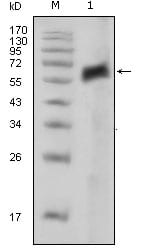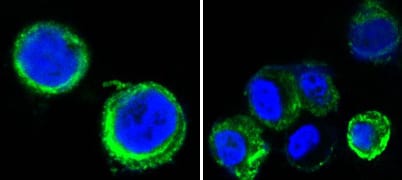

| WB | 咨询技术 | Human,Mouse,Rat |
| IF | 咨询技术 | Human,Mouse,Rat |
| IHC | 咨询技术 | Human,Mouse,Rat |
| ICC | 1/200 - 1/1000 | Human,Mouse,Rat |
| FCM | 咨询技术 | Human,Mouse,Rat |
| Elisa | 1/10000 | Human,Mouse,Rat |
| Aliases | UFO; JTK11 |
| Entrez GeneID | 558 |
| clone | 7E10 |
| WB Predicted band size | 97.4kDa |
| Host/Isotype | Mouse IgG1 |
| Antibody Type | Primary antibody |
| Storage | Store at 4°C short term. Aliquot and store at -20°C long term. Avoid freeze/thaw cycles. |
| Species Reactivity | Human |
| Immunogen | Purified recombinant extracellular fragment of human AXL fused with hIgGFc tag expressed in HEK293 cell line. |
| Formulation | Purified antibody in PBS with 0.05% sodium azide. |
+ +
以下是关于AXL抗体的3篇代表性文献及其摘要概括:
1. **文献名称**:*Therapeutic targeting of AXL receptor tyrosine kinase inhibits tumor growth and axial invasion in preclinical models of thyroid cancer*
**作者**:Gunda V, et al.
**摘要**:该研究验证了靶向AXL的单克隆抗体在甲状腺癌模型中的抗肿瘤效果。实验表明,AXL抗体通过阻断AXL与其配体GAS6的结合,抑制了肿瘤细胞的增殖、迁移及侵袭能力,并显著延缓了小鼠模型中肿瘤的生长和转移。
2. **文献名称**:*AXL antibody and MEK inhibitor as combination therapy for triple-negative breast cancer*
**作者**:Liu R, et al.
**摘要**:作者发现AXL在乳腺癌耐药细胞中高表达,并开发了一种人源化AXL抗体。体外和体内实验显示,该抗体单用可诱导肿瘤细胞凋亡,与MEK抑制剂联用则进一步增强了抗肿瘤效果,提示联合疗法在克服耐药性中的潜力。
3. **文献名称**:*Axl-specific antibody-drug conjugate targets acute myeloid leukemia cells and inhibits their engraftment in vivo*
**作者**:Kariolis MS, et al.
**摘要**:研究报道了一种新型AXL抗体-药物偶联物(ADC),可特异性靶向急性髓系白血病(AML)细胞。实验证明该ADC能有效内化并释放细胞毒性药物,显著降低AML细胞在小鼠骨髓中的定植能力,为血液肿瘤治疗提供了新策略。
这些研究展示了AXL抗体在肿瘤靶向治疗中的多样化应用,涵盖单药治疗、联合疗法及抗体偶联药物开发等领域。
AXL antibodies target the receptor tyrosine kinase AXL, a member of the TAM family (TYRO3. AXL, MERTK), which plays a role in cell proliferation, survival, migration, and immune regulation. Normally, AXL signaling contributes to tissue homeostasis and resolution of inflammation. However, its overexpression or hyperactivation is implicated in cancer progression, metastasis, therapy resistance, and immune evasion by suppressing anti-tumor immune responses. AXL is often upregulated in aggressive cancers (e.g., lung, breast, ovarian) and correlates with poor prognosis.
AXL antibodies are designed to block ligand (Gas6) binding or receptor dimerization, inhibiting downstream pathways like PI3K/AKT and MAPK. Some antibodies also induce antibody-dependent cellular cytotoxicity (ADCC) or phagocytosis to eliminate tumor cells. Clinical-stage AXL-targeting agents include Bemcentinib and AVB-500. evaluated in trials for solid tumors and hematologic malignancies.
Challenges remain due to TAM family redundancy and adaptive resistance mechanisms, prompting exploration of combination therapies (e.g., with chemotherapy, immunotherapy, or targeted agents). Biomarker development to identify AXL-dependent tumors is critical for patient stratification. Overall, AXL antibodies represent a promising therapeutic strategy to disrupt oncogenic signaling and remodel the tumor microenvironment.
×